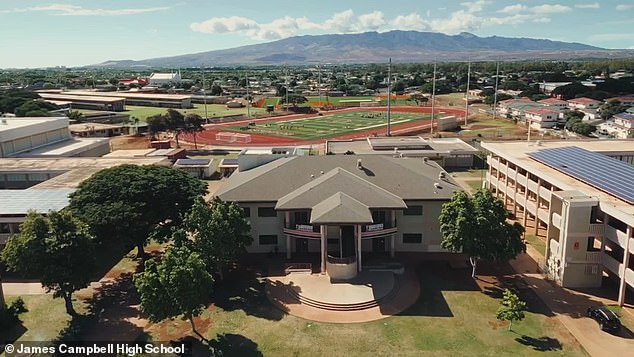Hawaii settles class-action lawsuit after female high school athletes were forced to practice water polo in the ocean, use the restrooms at nearby Burger King and change clothes under the bleachers, while male students had state-of-the-art facilities
Female athletes at Hawaii’s largest public school have filed a lawsuit against the institution after experiencing “sex discrimination.”
The class action lawsuit was filed against James Campbell High School in Honolulu’s Ewa Beach neighborhood.
Athletes and their families accused school officials of forcing water polo players to play the sport in the ocean — even in dangerous conditions with rough waves and high winds — because the school did not have a swimming pool.
Female athletes at the school were reportedly not given their own locker room facilities – like their male counterparts – and were instead told to change under the bleachers or on the bus. They were also told to run to a nearby Burger King if they needed to use the restroom.
On Friday, after nearly five years of legal back and forth, a settlement for the case was finally submitted for preliminary approval. The state promised to hire an independent evaluator to ensure equal opportunities for female athletes at Campbell High School.
Female athletes at Hawaii’s largest public school have filed a lawsuit against the institution after experiencing ‘sex discrimination’ (Photo: Water polo players at James Campbell High School)

Ashley Badis, 22, led the landmark Title IX case, which alleged “widespread and systemic sex discrimination against female athletes (Photo: Ashley Badis)

Abby Pothier was another plaintiff in the lawsuit. She opened up about the indignities of being a female soccer player at James Campbell High School (photo, Abby Pothier)
The assessor was hired to focus on the sports offering, facilities, transportation and scheduling to ensure fairness between the genders.
Another outcome of the settlement was a seven-year compliance plan and a hotline that students can use to anonymously report incidents that violate the updated guidelines and protect the students who speak out.
Jayma Meyer, counsel at Simpson Thacher & Bartlett LLP, said, “We are hopeful that this landmark settlement in Hawaii and across the country will be a building block for a future where every girl is assured of the rights required by Title IX .’
Title IX is the 1972 federal law that prohibited sex discrimination in education.
Ashley Badis, 22, led the landmark Title IX case — which alleged “widespread and systemic sex discrimination against female athletes,” the newspaper said. New York Times
Badis now plays water polo at the University of Hawai’i at Mānoa, but she was a pioneer in the 2018 application.
She and her high school teammates tried to hold James Campbell administrators accountable for their “discrimination,” but ultimately got revenge when the school threatened to cancel their water polo season altogether.
The high school students then escalated their activism by seeking legal representation to help them ensure equality for female athletes and hold the school accountable for their retaliation against the teens.
Another plaintiff in the lawsuit was Abby Pothier, a female soccer player for the school. Pothier said she had to carry her gym bag with her all day, along with her lunch box and backpack, due to the lack of facilities for female athletes.
Pothier also said the girls soccer team couldn’t practice on the playing field until the boys were ready. ‘It would already be half past eight. The lights would go out or the sprinklers would come on — maybe both,” she said during a video conference in 2022.
Court documents revealed that in the lawsuit, “plaintiffs alleged that despite knowing for decades about the differences between those athletics facilities for female and male student-athletes, the DOE continued to prioritize upgrading facilities for male athletes over providing of any facilities for female athletes.

Ultimately, the defendants (Hawaii Department of Education and the Oahu Interscholastic Association) maintained their denial of liability, saying that “the proposed settlement is fair and reasonable given the significant costs of protracted litigation.”

Badis and her high school teammates tried to hold James Campbell administrators accountable for their “discrimination” — but ultimately got revenge when the school threatened to cancel their water polo season altogether

Pothier said she had to carry her gym bag with her all day, along with her lunchbox and backpack, due to the lack of facilities for female athletes.
“The OIA, which administered policies and regulations for interscholastic athletics at DOE schools on Oahu, also allegedly discriminated against female athletes by prioritizing male athletes in scheduling competitions, seasons, and tournaments, and by publicizing and promoting male athletic competitions to promote.’
After the lawsuit was filed, the Hawaii Department of Education and the Oahu Interscholastic Association responded by claiming they had “done their best.” New York Times said.
The defendants claimed they made changes based on the complaints from years earlier, including a new baseball and softball field with artificial turf that included a building with lockers for softball players to use.
The school also allocated $6 million from a broader $60 million Title IX improvement budget to go toward better locker room facilities for female athletes.
Ultimately, the defendants maintained their denial of liability, saying that “the proposed settlement is fair and reasonable given the significant costs of protracted litigation.”
